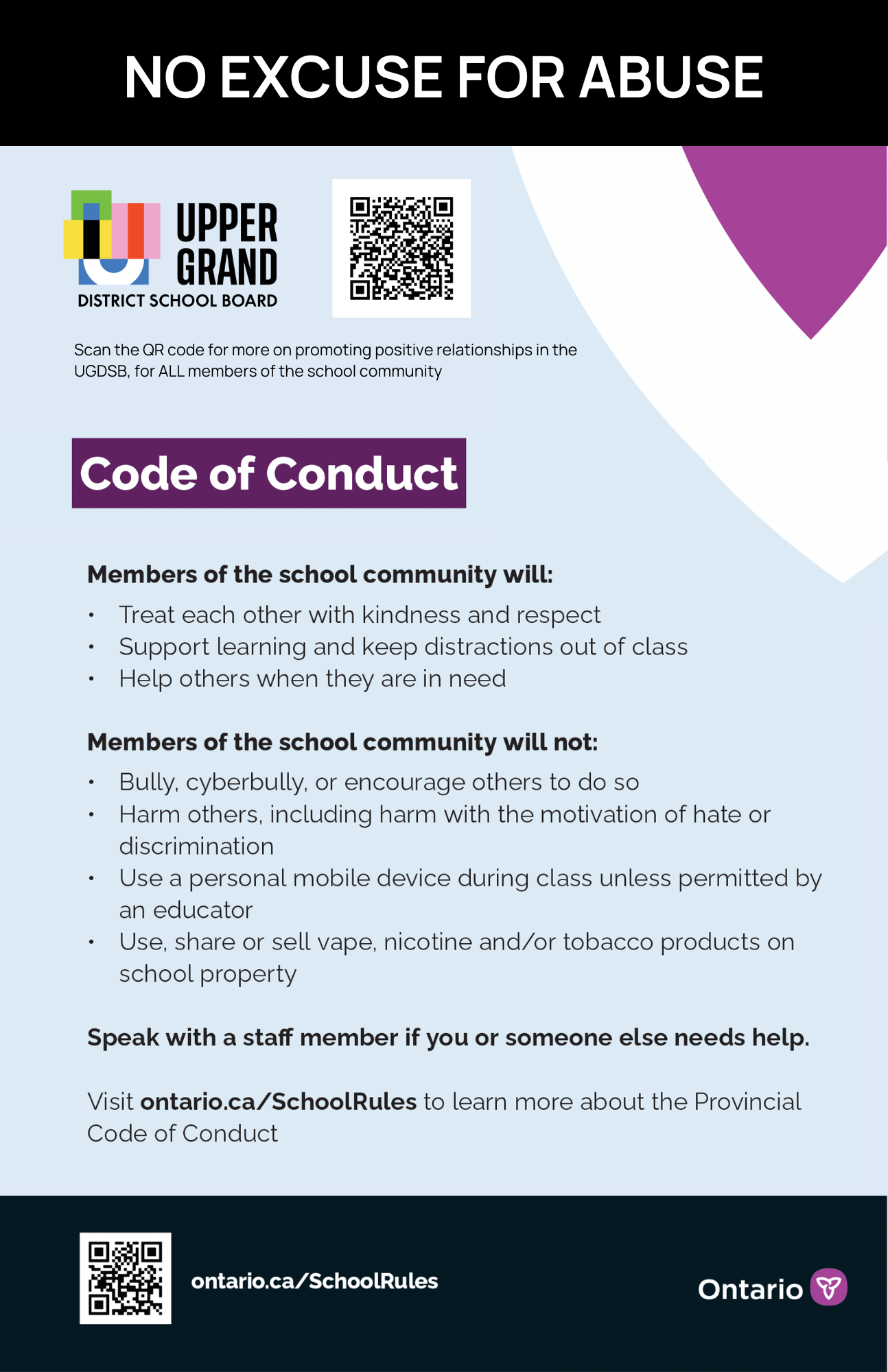Promoting Positive Interactions and Respectful Relationships
It is the responsibility of all members of a school community to do their part in ensuring positive interactions and respectful relationships. To maintain a safe, inclusive, and respectful learning and working environment, the following standards of behaviour must be followed by all staff (administrators, principals, vice-principals, educators, support staff), students, parents/guardians/caregivers, volunteers, trustees, community partners, community groups using board facilities, and all visitors on board property.
Your child’s education: Ontario’s parent/guardian guide to the school system
Standards of Behaviour
All members of the school community shall:
respect and treat others fairly, regardless of age, sex, gender identity, gender expression, sexual orientation, race, colour, place of origin, culture, citizenship, ancestry, origin, religion, creed, family status, marital status, socio-economic status, employment, housing, disability
respect differences in people, their ideas, and their opinions
treat one another with dignity and respect at all times, and especially where there is disagreement
respect the rights of others
respect all members of the school community
The board will not tolerate any behaviour that constitutes any form of workplace harassment. All incidents and complaints of workplace harassment must be reported and will be investigated.
UGDSB Policy 213 Code of Conduct
It is the policy of the Upper Grand District School Board to maintain a safe and inclusive learning and teaching environment through the adoption of a Code of Conduct. A Code of Conduct promotes responsibility, respect, civility and academic excellence, and sets clear standards of behaviour for all members of the school community. The goal is to create a positive school climate where all members of the school community feel safe, included and accepted.
Use of Mobile Devices in Schools
The UGDSB has revised its Code of Conduct to reflect new guidelines from the Ministry of Education about cell phone/mobile device use in schools as per PPM128: The Provincial Code of Conduct and School Boards Codes of Conduct.
Students not to use personal mobile devices during instructional time except under the following circumstances:
for educational purposes, as directed by an educator
for health and medical purpose
to support special education needs
Students in Grades 7-12:
personal mobile devices must be stored out of view and powered off or set to silent mode during instructional time, except when their use is explicitly permitted by the educator
Students in Grades 6 and below:
personal mobile devices must be stored out of view and powered off or set to silent mode throughout the full instructional day, except when their use is explicitly permitted by the educator
Definitions (excerpt from UGDSB Policy 408 Harassment in the Workplace)
Workplace Harassment
Workplace harassment is defined by the Occupational Health and Safety Act as “engaging in a course of vexatious comment or conduct against a worker in a workplace that is known or ought reasonably to be known to be unwelcome.” Workplace harassment includes sexual harassment and racial/ethno-cultural harassment as defined below.
Workplace Sexual Harassment
Workplace sexual harassment is defined as:
engaging in a course of vexatious comment or conduct against a worker in a workplace because of sex, sexual orientation, gender identity or gender expression, where the course of comment or conduct is known or ought reasonably to be known to be unwelcome, or
making a sexual solicitation or advance where the person making the solicitation or advance is in a position to confer, grant or deny a benefit or advancement to the worker and the person knows or ought reasonably to know that the solicitation or advance is unwelcome.
Racial/Ethno-cultural Harassment
Such workplace harassment involves any action that ridicules, degrades, or expresses hatred or undue attention based on race, ethnic group, skin colour, language, dress, or religion.
Possible Outcomes
If it is found that workplace harassment has occurred, or that the UGDSB’s Code of Conduct has been violated, the board shall take whatever action is appropriate. Options may include, but are not limited to:
Informing the person(s) that their comments and or behaviour are inappropriate and in contravention of board policy (and/or the Ontario Human Rights Code), and that the harassment must stop.
Prohibiting access to a school site and issuing a trespass notice and a warning that police will be called if attempts are made to enter the property.
The principal excluding a person from the school under section 265(m) of the Education Act.
Directing the person to an alternative staff contact for future interactions.
Contacting the police in the case of a threatening situation where there is concern for the safety of an employee or others.

